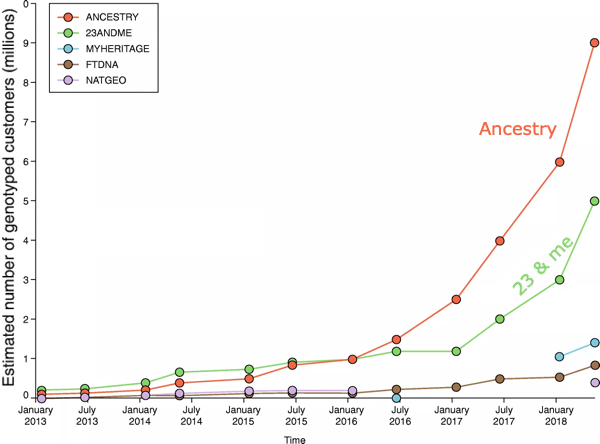 Products
Products
 Genetic DNA testing companies
Contact
Genetic DNA testing companies
Contact
Don's Home
 Products
Products
 Genetic DNA testing companies
Contact
Genetic DNA testing companies
Contact
|
Under Construction 
As of October, 2018 some 10 million people worldwide have had their DNA analyzed by a direct-to-consumer genetics company like 23andMe, Ancestry.com, or MyHeritage.
The study in Science concludes that around 60 percent of Americans of European descent could be matched to a third cousin or closer relation.
* FamilyTreeDNA (FTDNA)
FTDNA has been doing genetic genealogy the longest and is particularly suited to genetic genealogy, since it offers three kinds of genetic tests (autosomal, Y, and mitochondrial) as well as a chromosome browser tool. For detailed Y and mitochondrial testing, FamilyTreeDNA is often the best choice. It offers a number of tools to use in sorting through your matches to try to assign them to your P or M side and to MRCA discussed by Roberta Estes
* MyHeritage
A relative newcomer to the field of genetic testing, they already have more people who have tested than any companies except Ancestry and 23&Me, and a larger percentage of them live outside the US than is true for other companies. They have a strong focus on genealogy, encourage uploading of family trees, and provide excellent tools to compare your tree with those of your matches. Roberta Estes has a recent blog on a new feature on My Heritage that appear to be a very promising tool, called “Theory of Relativity.”
* YSEQ
YSEQ (established by FTDNA specialists who left the company) is a cost effective tool for advanced testing (such as full sequence mitochondrial and advanced Y SNP testing). But you would need to work with a project coordinator or experienced genetic genealogist to get much from the results.
* 23andme
23andme offers 3-way tests (Y, mitochondrial, and autosomal) at relatively low cost, and it offers useful tools such as matching, matches-in-common, and a chromosome browser. It has a relatively large pool of users, but many of them have little interest or background in genealogy, relative to the other companies.
* LivingDNA
This company specializes in the British Isles but is expanding to other countries. It offers relatively refined Y and mitochondrial haplogroup assignments. LivingDNA is adding matching functions in “Beta” testing now; until that expands, its utility for genetic genealogy will be very limited. But they are accepting free transfers of data from other companies, so it could be wise to transfer or do their test.
* National Geographic (NatGeo)
This test is for deep ancestry only and not for recent genealogical purposes except as it relates to the use of haplogroups or inference of geographical ancestry. It uses atDNA but in a different way than the other tests.
Source: Panel Presentation at the Davis Genealogy Club
